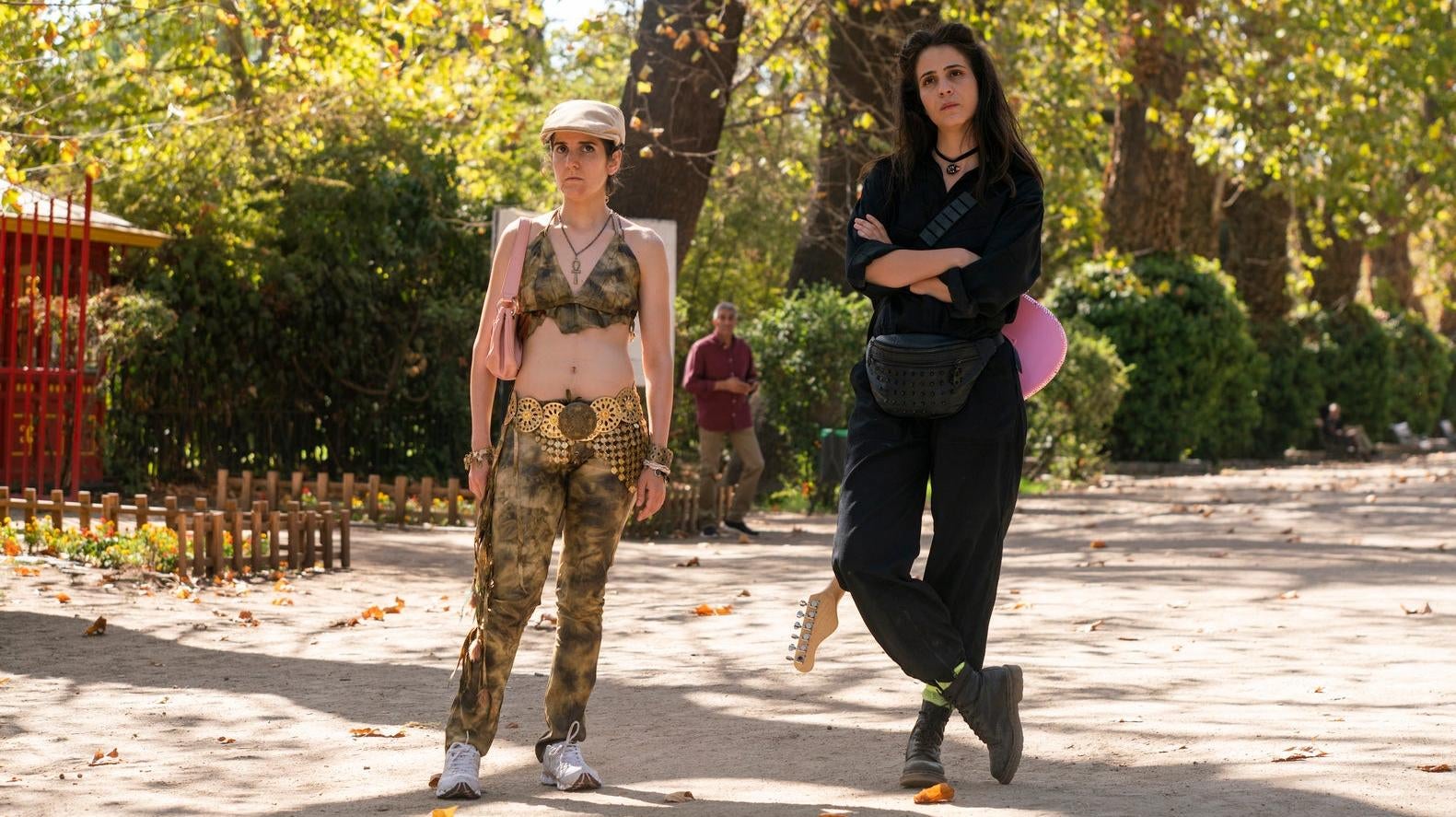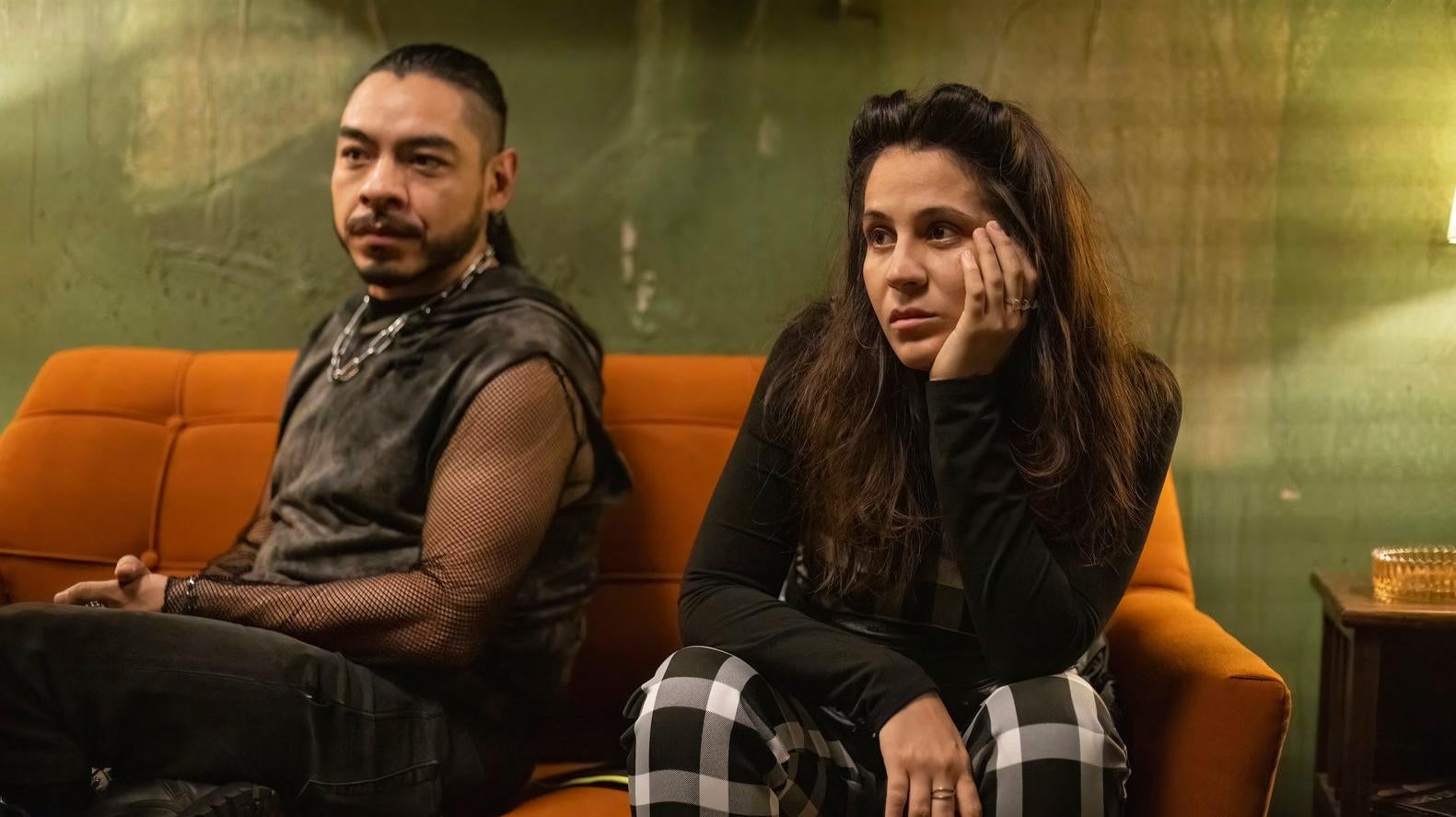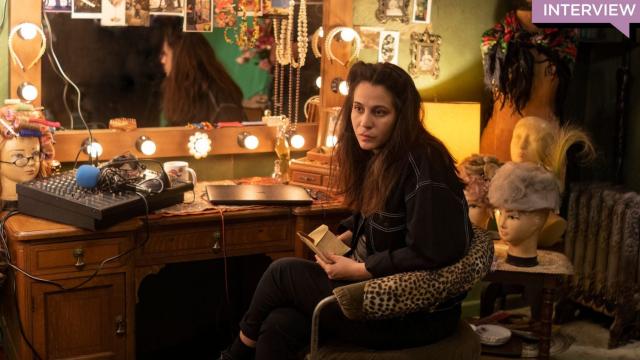Perhaps the most accurate portrayal of horror-loving friends ever captured on screen, Los Espookys — HBO’s underrated comedy series — is back for season two with its earnest eccentric vibes. It comes from the brilliant minds of stars and writers Ana Fabrega, Julio Torres, and Fred Armisen, and while it’s easy to liken the show to Taika Waititi’s original What We Do in the Shadows (mixed with Edgar Wright’s Spaced and a dash of Ghostbusters), it truly exists in its own weird as hell world.
In the first season, we met a group of longtime friends: goth Renaldo (Bernardo Velasco), mysteriously powerful chocolate heir with blue hair Andrés (Torres), stoic Úrsula (Cassandra Ciangherotti), and sincere but chaotic Tati (Fabrega); Armisen, who’s soon to be playing another spooky uncle on Wednesday, is Tico, Renaldo’s uncle. The friends run a horror side hustle as Los Espookys, staging supernatural or scary situations for clients who want to trick marks into thinking it’s real for various personal or business purposes. Season one highlights included an exorcism for a priest who wanted to outdo a competing priest, and a Clue-esque whodunnit for the inheritance of wealthy deceased person. It’s brilliant and to make things more fun, the characters also often run into real haunting hijinks or interact with the beyond in clever ways.
io9 recently caught up with Los Espookys star Cassandra Ciangherotti to talk about season two, where we get to find out more about her character; what it’s like working with the Los Espookys team; and what she thinks about seeing Mexican horror lore in a new light on the show.
Sabina Graves, Gizmodo: The main Espookys squad feels like a real group of friends. Were you acquainted with co-creators Ana Frabega and Julio Torres before joining the series? Or was this something you went out for?
Cassandra Ciangherotti: I auditioned for it. I didn’t know Julio and Ana before we started the show. I was in Mexico City and I remember that my manager [told me] this series was dark with gothic characters. I didn’t understand it quite well, to be honest. And then when I read the scenes, I was confused. And I got the part and read the script and was more confused. I didn’t know what what was going to come out out of something that was so different. I mean, the humour was like nothing that I’ve ever seen before.
Gizmodo: It’s so unique, and it’s really cool to see more types of Latinos in entertainment — especially comedic genre stories. I deeply relate to growing up being really into horror or Tim Burton and being the odd goth kid in the family. We don’t generally get to see that and the humour on the show is like something we’ve never really seen before. Did it take you a few episodes to get into the groove of getting the vibe?
Ciangherotti: Sure. It was it was very different because I’ve tried comedy before and I love it. I wish I had more opportunity to do it, but I come from a more dramatic background. And these are people that like, they’re comedians for a living, they write the show, they understand the characters perfectly — and when I approach comedy, I do it with a lot of drama because I think that’s funny. Yeah. And it works. It has been a growing experience in such different levels of my life. And I really like what you’re saying because Mexico is very spooky. I love the way that they portrayed that in the show.
Gizmodo: Úrsula is like the archetypal straight man on the show surrounded by these character personalities like Tati (Fabrega) and Andrés (Torres).
Ciangherotti: Right. [She’s] the grounded one, right? It’s like everything is happening around her. I would do a lot of drama sometimes, and Julian and Ana were like trying to do this with a non-dramatic approach and it [paid] off [not] just in my work but it worked in my life as well. Now, when I’m in any kind of situation that is very tense, I tend to think in that situation as Julio and Ana would.

Gizmodo: The influence. Let’s talk a little bit more about Úrsula’s arc this season. We get a little bit more backstory with some of the episodes, like what she was like when she was a kid. Oh my God, that was so good!
Ciangherotti: Yeah, I love Úrsula in [her] childhood. It was so weird that Julio and Ana and Mara [Vargas Jackson], who writes the series with them, that they [included] the background of not liking the double “L.” I felt so connected to that — I was like that when I was a kid. I was like, this doesn’t make any sense. Or the “H,” you know, in Mexico, the “H” is like, why do we use it? And I don’t know. It was something really weird; I felt like they were getting into my childhood in a way, but I love that I felt really related to Úrsula in this season.
Gizmodo: I want to touch on her relationship with Tati this season. It seems like they’re hitting a rough patch as sisters.
Ciangherotti: Tati is all over the place. We don’t know what’s going on. What is the next thing that she’s going to do? But I think that in this season, we finally get to see Úrsula lose her patience a little bit with Tati. At one point [she’s like] “I’m going to kill you if you don’t stop.” And I like that because we got to see a little bit of Úrsula be impatient with her.
Gizmodo: It’s so wild to see how every character fits in this sort of like, you know, a modern Escooby gang, really. What have been some of your favourite moments on the show? And has being on the show inspired you to like more goth and spooky things?
Ciangherotti: For sure. I think I didn’t quite understand that when I started, but then I realised that it has been me all along. I’ve always seen gothic people, people dressed in black all day long. I was like, “What’s that all about?” and then I got to understand, because I got to talk to a lot of people that live in that way. They have created a way of living with the shadow outside — we all have shadows, right? We all have things that we have to approach in ourselves that we don’t like: ambitions, envy, and jealousy. And it’s all about our shadows but we tend to put them away and to dress in colours. I think that dark people are the sweetest because they have understand that there is darkness. So they have a relationship with darkness that is very romantic and sweet and tender. It’s almost like you’re if feeling envy, you’re telling yourself, “It’s ok. It doesn’t matter. I love you. You’re just feeling it. Just let it pass.”

Gizmodo: Yeah. And then there’s all the leyendas like La Llorona.
Ciangherotti: We have Dia de Muertos — which, there’s nothing more spooky, it’s more spooky than Halloween. You’re [getting] a visit from your parents, your grandparents, which is like, if you didn’t like them…
Gizmodo: I love that because especially in la cultura Mexicana you have the relationship with Dia de Muertos, which is very much about accepting death and the afterlife as part of the journey. And I think that influences a lot of people who are fascinated by it or who embrace it, who are dark. Just like you said, there’s a sweetness to them which you see in some of these characters. Especially with the show, you see it celebrated and here they’re definitely a part of how the living can help the dead in a way, and vice-versa.
Ciangherotti: That’s what it is all about. They’re very sweet people and humour is related to the darkness. Like when someone is telling a joke and it gets you because it gets you on the dark side. And that’s the side that you weren’t looking at, the dark in there. Humour is totally related to the darkness. So it’s very cool that they found a way to be together in the show.
Los Espookys season two is now streaming on HBO Max.
Want more Gizmodo news? Check out when to expect the latest Marvel and Star Wars releases, what’s next for the DC Universe on film and TV, and everything you need to know about House of the Dragon and Lord of the Rings: The Rings of Power.
